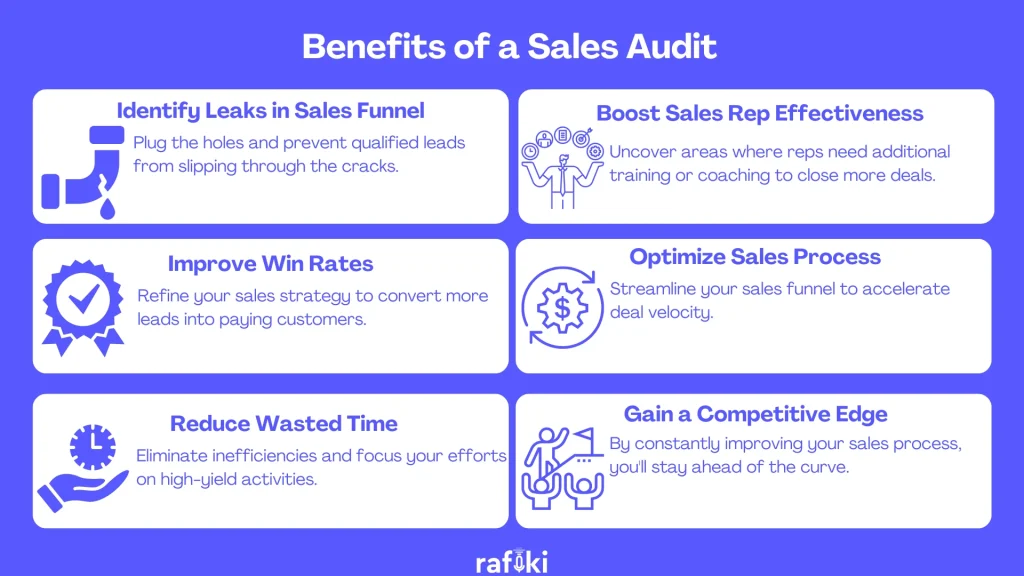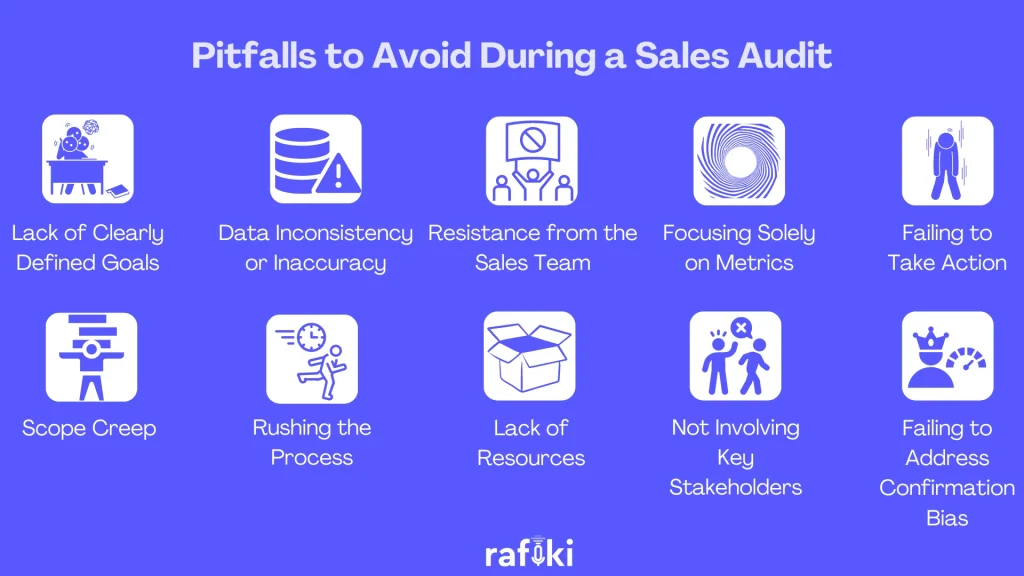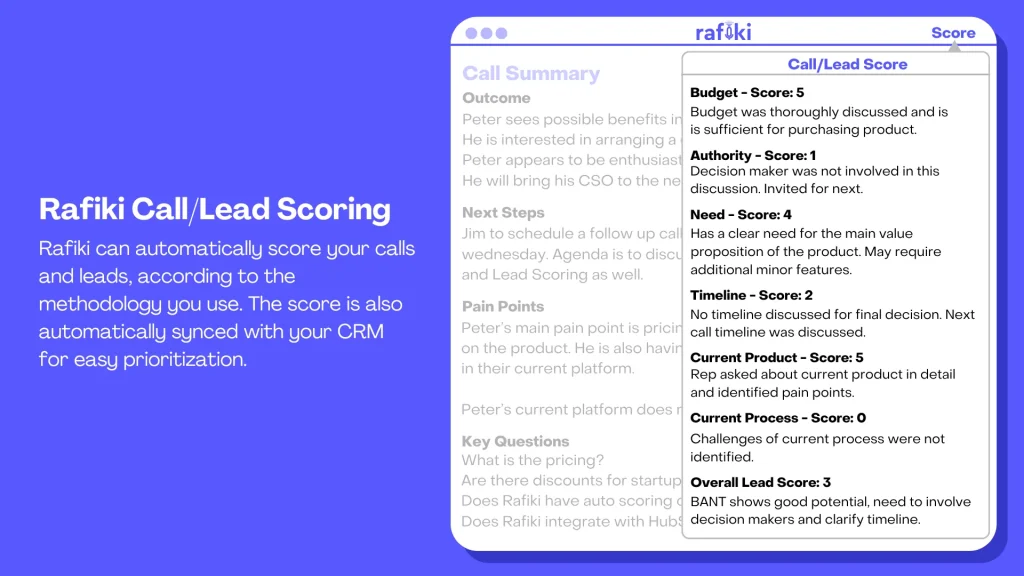Why Rafiki
Pricing


Pricing
Solutions

RevOps Leaders
Synchronize revenue generating functions

SDR Leaders
Get your team aligned and Coach your Reps 3x faster at scale

Sales Leaders
Unlock pipeline truth, drive confident forecasts

Ever feel like your sales team is stuck in second gear? You pore over sales metrics, but identifying bottlenecks and improvement opportunities feels like finding a needle in a haystack. A well-conducted sales audit can be your game-changer.
It's a systematic evaluation of your sales process, designed to identify strengths, weaknesses, and areas ripe for optimization. By taking a deep dive into your sales data and interactions, you can unearth valuable insights you might otherwise miss.
In this article, we'll explore the power of sales process audits and how you can leverage them to streamline your sales funnel and boost revenue.
A sales audit is a comprehensive assessment of your sales funnel, designed to identify strengths, weaknesses, and opportunities for improvement. It's akin to taking an X-ray of your sales operation to pinpoint any fractures or blockages hindering performance. By analyzing various data points, including win/loss ratios, sales call recordings, and customer feedback, you can gain valuable insights into how effectively your reps are following the sales process, qualifying leads, handling objections, and ultimately closing deals.
A sales audit goes beyond the numbers, however. It also examines the qualitative aspects of your sales process, such as sales communication strategies, sales collateral, and overall rep morale. This holistic approach ensures no stone is left unturned in your quest to optimize your sales engine.

Now that you understand the benefits and potential pitfalls of a sales audit, let's delve into the steps involved in conducting one effectively.
The first step is to establish clear objectives for the audit. What specific areas do you want to assess? Are you looking to improve win rates, shorten sales cycles, or identify roadblocks in the qualification process? Having well-defined goals ensures the audit remains focused and delivers actionable insights.
Data is the lifeblood of any successful sales audit. Compile data from various sources, including your CRM (consider using Rafiki to keep your CRM data squeaky clean!), sales call recordings, win/loss reports, customer feedback surveys, and sales rep activity reports. Analyze this data to identify trends, patterns, and areas for improvement.
Once you have a clear understanding of your data, take a deep dive into your sales process. Map out the different stages, including lead generation, qualification, proposal development, presentation, negotiation, and closing.
Evaluate each stage for effectiveness. Are there any unnecessary steps slowing down the process? Are reps equipped with the right resources and training to navigate each stage successfully?
Sales rep performance is a critical component of any sales audit. Analyze individual win/loss ratios, call recordings, and customer feedback to identify areas where reps excel and areas where they might need additional coaching or support. Consider using Rafiki's Smart Call Scoring to objectively assess rep performance across calls, deals, and accounts. This can save time for both reps and managers who would otherwise have to listen to every call manually.
Based on the insights gleaned from the audit, develop a comprehensive action plan that outlines specific improvements to be implemented. This plan should include clear goals, timelines, and designated owners for each task. Ensure the action plan addresses both quantitative and qualitative aspects identified during the audit.
The true value of a sales audit lies in taking action. Implement the changes outlined in your action plan and monitor their effectiveness. Use your CRM and sales data to track progress and measure the impact of the changes on key metrics like win rates, sales cycle length, and overall sales performance. Use Rafiki to make sure that your reps are actually putting into action the improvements you outlined and the new sales playbook.
A sales audit shouldn't be a one-time event. Regularly revisit your sales process and conduct follow-up audits to ensure your sales engine remains optimized. The business landscape and customer needs are constantly evolving, so continuous improvement is key to maintaining a competitive edge.
A successful sales audit isn't a solo act. Collaboration with other departments is key to gleaning well-rounded insights and ensuring effective implementation of your action plan. Here's how to leverage other teams:
Before we move on to what you should do after an audit, let's remind ourselves the common mistakes to avoid when conducting a sales audit:

So, you've conducted a thorough sales audit and identified valuable improvement opportunities. Now comes the crucial step: ensuring your team embraces and implements the recommended changes. Here are some strategies to boost adoption:
Your sales audit may be complete, but the work doesn't stop there. To maintain a high-performing sales engine, incorporate ongoing sales process monitoring. Here are some key practices:

By conducting a sales audit and implementing the insights it provides, you can empower your sales team to achieve peak performance. Keep in mind, the journey towards sales success is ongoing. Embrace continuous monitoring and refinement to keep your sales engine firing on all cylinders.
Ready to explore how Rafiki can streamline your sales audit process and unlock hidden sales potential? Sign up for your free 14-day trial today and see the difference Rafiki can make.
Build A Continuously Optimized Sales Engine